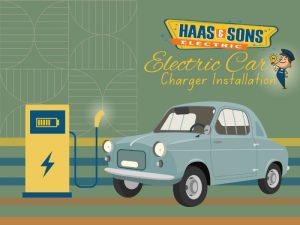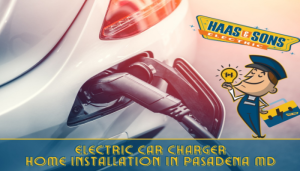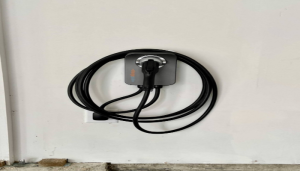EV Charger Installation in Maryland
When many Americans visualize an all-electric vehicle (‘EV’ for short), they often think of Tesla’s sleek and contemporary options that come with fun features like their ‘Insane Mode’ driving option. That’s likely because Tesla is a powerhouse in the news cycle, an innovator of design, and they advertise really well. Recently, we've seen new players come on board. Ford's Lightning pickup truck is the most recent newsmaker. With the rise in climate awareness, carmakers are doubling down on electric vehicles. GM announced in January of 2021 that all of their vehicles manufactured by the year 2035 would be electric..
As of 2021 there are more than 20 models of EVs that are currently cruisin’ the highways of America without a drop of gasoline. With that variety, and the ever-expanding third-party tech infrastructure industry, choosing a safe, reliable and efficient home charging station (more on this nomenclature next) can be difficult. A unit must be compatible with your vehicle, and smart chargers can monitor and regulate the charge to maximize efficiency. These high-powered and fast-charging level-2 units are often hardwired but some are portable and require a dedicated outlet.
At Haas & Sons, we’ve had the opportunity to install many in-home systems for EVs in both residential and commercial settings, often found in the garage. We’d like to share with you some common tips on selecting and installing the right one, which often requires a permit and a municipal inspection. A professional electrician will first assess your electrical panel for load management, measure the space, and plan the best approach. The work involves running a new circuit with a new breaker, often in conduit with new wiring to ground the electrical system. They will connect a junction box with a mounting bracket on the wall to mount the unit. The power supply to the unit is then connected to a connector on the end of a charging cable. Once the system is installed, they will test it to ensure it is compliant with voltage and amperage requirements. They will then help you configure and schedule the system to work optimally. A certified electrician can also troubleshoot any issues, help you maintain the system, and upgrade it later.
EV Charger Installation in Maryland FAQ
It's hard to estimate the cost to install as every home's setup and electric vehicle specifications are unique.
You can likely expect to spend an electric car charger installation cost of between $1000 and $2500 if the electric panel is in the garage and $3000 to over $6000 if the main panel is in the basement (not including the actual unit - which is not included in the vehicle charging station installation price.) The location of the electrical panel, the desired location of the EV charger, and the size of the EV charger will determine the electric car charging station installation price. Some counties here in MD also have different safety requirements depending on the location of the EV charger. Howard County, for example, will require the EV charger to be GFCI protected if it is installed in the garage.
- Now multiply 32 amps by how many hours per day your car needs to charge.
- For this, I will figure on a maximum charge time of 8 hours assuming you kill your battery every day.
- 32 amp x 8 hours= 256 amps per day x 365 days = 93440 amps per year.
- Now we convert that to watts so 93440 amps x 240 volts is 22,425,600 watts.
- Let’s divide that by 1000 to get the Kilowatts. 22,425,600/ 1000= 22,425.6.
- BGE is currently charging 0.08 per Kilowatt (as of September, 2021)
- 22,425.6 KW x 0.08c per KW = $1794.05 per year.
No, we do not recommend trying to install your own. Installing power for a Level 2 electric vehicle charging point is not something for a DIYer or amateur to undertake. Doing so may void any warranty and insurance companies want installs by licensed companies. This requires wiring into the electrical panel which if you don’t know what you are doing can result in injury or death.
A level 1 charger is a unit that plugs into your basic 110 outlet and then into your vehicle. The downside here is the very slow charging time. If you need your car to be able to start each day fully charged, and you have a moderate to long commute, the level 1 charger likely won't keep up. As of 2021, level 1 chargers typically provide between 12 amps and 16 amps of continuous power. At these levels of output, a Level 1 charger is estimated to deliver between 3.5 and 6.5 miles of range per hour of charging. If you need to commute or drive 100 miles each day - you'd need 15 hours to charge your car. That's cutting it close if you're home at 6 pm and out the door by 6 or 7 the next morning.
The level 2 charger solves this slow-charging dilemma. Wired directly into your circuit or breaker box, these units produce between 16 and 48 amps of power output, which can deliver between 14 and 35 miles of electric range per hour of charging. These units can charge your EV up to 4x faster than the regular Level 1 charger. This means your 100 miles of charge can be achieved in just 3-4 hours of plug-in time. Be sure to review the manufacturer's requirements, every vehicle has a different charge rate, so knowing the amount of power alone isn't enough.
Absolutely. All currently available electric vehicles can charge on a Level 2 unit - the plug/interface may change depending upon what vehicle you buy - but the unit can provide power to any of the commercially available vehicles. Adding an EV charging station to your home is also a great "perk" as you get ready to sell in this hot market. "EV Car Ready" is an amazing amenity to offer potential buyers.
Most homes built from the 1970s and newer are generally easily compatible for an EV charger. Homes dating before 1970 are more likely to need their electrical system upgraded.
The breaker size you need will depend on EV charger itself. Some chargers like the Ford Lightning charger need upwards of 80 amps of power while others require just 20 amps. In general, the bigger the charger, the faster it can recharge your batteries.
You do not always need a 200 amp panel to install an EV charger. An electrician will need to do a load calculation for the home to verify your system can handle the additional power usage from an EV charger.
If you want to charge your electric car quickly, then you will need a 220-volt outlet. Some cars can be recharged on 120v, however, this will take hours longer compared to a 220-volt charger.
EV chargers will typically use 7-12 kW (kilowatts) of electricity per hour while charging your car. The equation to figure this out using a 32 amp EV charger is:
[(32 amps x 240 volts)= 7,680 watts] / 1000 = 7.68 kW
If your power provider is charging $0.12 per kW/hr then multiply the number of kilowatts times the cost per hour:
(7.68kw x $0.12)= $0.92 per hour
You do not need any special equipment to charge your EV aside from the charger unit itself.
Most EV cars will allow you to recharge on a standard outlet. The recharge rate is very, very slow, however. It is highly recommended to have a 240v charger installed.
Recharging an electric car on 110v can take over 24 hours to achieve a full charge depending on how depleted the battery is.
Installing a 240v outlet for a car charger with the electrical panel nearby can easily run $1500-$3500 for the installation. The further your electric panel is from where you want the EV outlet installed, the more expensive it will be. If you want to get a permit for the work, the electrician will normally charge a fee for acquiring a permit.
We can add a Level 2 charger to your home, which will definitely charge your Tesla. The superchargers that you drive to for a charge are a different type of unit that is overkill for a home installation in most cases.
What is a “Home Charging” System for Electric Vehicles?
Believe it or not, there really isn’t such a thing as a ‘home charging station or system’. This is because an electric vehicle charger is actually within the on-board components of the vehicle. So while you and your friends might be saying ‘home charger’ the proper term is actually ‘Electric Vehicle Service Equipment’ or ‘EVSE’ for short. The reason an EV owner needs a EVSE is that your existing home electrical system is most likely not outfitted to charge an EV. In short, the EVSE allows your home’s electrical system to work with the EV in a safe and efficient way for regular and consistent charging.
Checklist for Choosing an EVSE for Your Home
The biggest issues with most homes are that they’re wired for smaller appliances that can’t handle the energy needs of an EVSE and many weren’t built with EVs in mind, so sometimes we have to upgrade or replace the main electrical panel. Additionally, the manufacturers of EVSEs all vary on their features and options, so think long-term here. Consider the following before you buy anything:
EVSE Costs:
It’s safe to say that a reliable EVSE unit will start around $500 and go up from there. Depending on the system’s capabilities (listed below) and additional features you might select, the higher the price can be. It’s also worth mentioning that the amperage capabilities of the EVSE will affect the price, because as amps go up, the system costs more. There’s a big difference between the most basic 20 amp EVSE and Tesla's behemoth 100 amp system. Please note that this does not include installation, so if you need a local electrician near you in Severna Park for help, call Haas & Sons.
Volts Needed for an EVSE:
Level 1 chargers use 120 volts and level 2 chargers use 240 volts. Nearly all homes in Maryland are capable of providing 120 volts and 240 volts. With either level charger, we recommend having a dedicated circuit installed so it won’t cause issues with other areas of your home.
Amperage Needs for an EVSE:
Amperage of your EVSE impacts your rate of charge, so it’s suggested to get one that’s 40-50 amps. Smaller level 2 EVSEs only require 30 amps, but as technology changes and different models of EVs are released, it’s safe to assume that 50 amps is the new standard, so save yourself on future upgrade costs. Plus, this allows for faster charging on vehicles that can accept higher amps.
You might need to ‘heavy up’ or replace your existing electric panel (the breaker box) to add an electric vehicle charging station. A lot of older homes in Maryland were designed with only 100 amp main electrical panels and when adding 30-50 amp of use from your EV charger, we may need to upgrade to 150 amps or 200 amps. Additionally, as EVs become even more popular than they are now, this is a good investment for selling your home down the line, as it will be EV-compatible on the MLS.
EVSE Location & Cable Length:
Make sure you select a location that’s accessible for your EV. Consider cable length in this step, as most EVSEs come with a connecting cable that is 8 to 25 feet in length. That’s a big difference, so if you’re installing an EVSE on a pedestal outside or around the back of your garage, that cable can be used quickly. Consider all scenarios when looking for a permanent location of your EVSE and which one you buy.
EVSE Add-On Features:
Living in the age of on-demand products and services, one might think that having all the bells and whistles on their EVSE would be the route to go, but we’d like to exercise some words of caution. Although it sounds really cool to have a touchscreen EVSE that has timers, usage meters, monitoring capabilities from your phone, and more, each of those additions comes with problems. One of the major ones is if you experience a loss of internet connectivity. In that situation, if you had a smart EVSE, you would be without the ability to charge. Additionally, each time you add a new feature to your EVSE you’re increasing the cost and in many situations, creating redundancy, as many of these cars come with apps and in-car tech for diagnosing performance.
EVSE Safety Precaution:
Last but not least, be certain that your EVSE comes standard with built-in GFCI (ground-fault circuit interrupter) protection. This will protect you and your family from accidental shocks, which could occur if the EVSE didn’t have grounding protections. There would be nothing worse than going to enter your vehicle and being shocked badly or permanently hurt, so make sure it’s protected.
Protect your investment with whole home surge protection:
Speaking of safety tips, it’s a wise idea to consider a whole home surge protector for the safety of all your electrical items. Many moons ago, households had far less plugged in 24/7 than we do now. With so many household electronics and appliances constantly connected, you’re potentially at risk for an electrical surge that could cause house-wide damage. Many of these options run anywhere from $500-$800 to have installed.
Top 3 EVSE Choices:
As we mentioned above, we’ve had the opportunity to install many EVSEs and we’ve learned which ones require us to come back for servicing and which ones last without issue. In no particular order, our Top 3 recommendations are:
Tesla Wall Connector:
It would be difficult to talk about EVs and EVSEs without mentioning Tesla. Tesla has done an exceptional job of making electrical sexy, fast, and fun. Their EVSE is no different. Starting at $500, the Tesla Wall Connector is a no-brainer for the Tesla owner, but it should also be considered for the other EV drivers out there. Tesla currently offers one unit that is hardwired and uses up to 48 amps at 240 volts. They also offer the fastest recharge speeds, so if you’re pushing your vehicle’s range limits often, this would be the product for you! The main unit comes with a 4-year warranty and accessories have a 1 year. Unfortunately, Tesla does require you to purchase additional components separately, such as cable management fixtures, adaptors, and longer cables.

Siemens VersiCharge:
If you don’t own a Tesla, the Siemens VersiCharge is a great option for most EV owners. The VersiCharge is a bit more expensive than the Tesla Wall Connector but it’s also really versatile and an all-in-one package. The VersiCharge doesn’t try to upsell you on anything, instead, they just offer you everything from the start. It comes with built-in cable management, a 20-foot cable standard, and it can plug directly into a NEMA 6-50 outlet (same as a clothes dryer). This unit comes with a 3-year warranty and offers universal compatibility.

ChargePoint:
The ChargePoint Home Flex EVSE is the most costly option starting at $699, but it’s availability is affecting the price. The ChargePoint is the second most popular charging station we install next to Teslas. It is one of the more powerful chargers on the market too with a max of 37 miles per hour when set on 50 amps. It’s Energy Star Certified, Amazon Alexa compatible, has an app for scheduling and monitoring charging, offers reminders and notifications, it’s compatible with all makes of EV, and it’s noticeably smaller than other options. Overall, it’s a great smart device!

JuiceBox:
The JuiceBox 40 unit is also common for us to install. It is not as powerful as the ChargePoint, with only a 40 amp capability. They do make a JuiceBox 48 but it has been out of stock for months. It does have all the features you’d expect from a charger- wifi, works with Alexa, scheduling, and notifications, among other features. These units also have a starting point in the $600 range and can be found on Amazon.
Is an Electrician Needed for My Electric Car Charger Home Installation?
Yes, you should always have a licensed electrician handle the wiring in your home. A common question that arises at Haas & Sons is, "Do I need an electrician to install my EVSE, and if so, how much will it cost?" To answer that, let's first discuss why hiring an electrician should be considered for all households.
While it's tempting to take the DIY route with many household electrical projects, we strongly advise against it. Attempting this on your own carries significant risks, including the potential for personal injury or damage to expensive equipment. Additionally, most insurance policies will not cover claims resulting from work that hasn't been performed by a licensed professional.
If the task is as simple as swapping an outlet, it might be reasonable to research and attempt it. However, as you may have seen, installing an EVSE (Electric Vehicle Supply Equipment) involves multiple steps and potential customization depending on your home's setup and the unit you’ve purchased. Furthermore, some local regulations require secured permits and inspections to finalize the installation, and these are processes that only a licensed electrician can handle. A qualified electrician will be familiar with the specific requirements of your county and will manage all the technical aspects of the installation effectively.
How Much Does Installing an EVSE Cost?
Many homeowners enjoy the ease of having an electrician come out and install their new EVSE. On average, installing an EVSE will run you between $800 and we’ve done some over $5000. The benefits of going with a local electrician over a ‘recommended installer’ from your EVSE manufacturer are the local electricians know the codes for your area, the layout of the home, and aren’t some out-of-state company. Additionally, it’s always nice to have a sole-contact for all your household electrical needs. Plus, it’s nice having an easily-accessible local contact versus having to call in a large corporation each time you need advice or electrical repairs.
Variables That Can Increase EVSE Installation Costs?
The biggest factors when figuring out if your install will be on the lower end or the higher of installation costs are:
- Do you need to upgrade your main panel?
-
-
- This is the most costly factor, as a house with existing capabilities to handle an EVSE will not incur the costs that are associated with upgrading your system if your house is not capable.
-
- Will the EVSE be installed near the circuit board or farther away?
-
-
- The farther away you decide to mount your EVSE in relation to your panel determines how much conduit is needed to run the wires back and forth between the panel and unit. The more conduit, holes drilled, wires installed, and so on, will increase the price. The materials of these components can also change depending on your needs, so that can increase the cost too.
-
What our Happy EVSE Clients Have to Say on Google
Great and prompt service! I called on a Monday, had an appointment for Wednesday, got a call back later in the day and was able to secure a same-day appointment for the technician to come out and do an assessment. He was able to come back on Friday to install the outside plug for our electric car charger. The charger we purchased had not yet arrived yet, but when it did arrive a couple days later, the technician was back to install the charger. I would definitely use Haas & Sons again!
Nicole Y.
⭐⭐⭐⭐⭐
Summary:
Deciding to purchase an electric vehicle is a fun occasion and worrying about your EVSE isn’t something that should deter you from proceeding. That being said, because every element of this process deals with electricity and new products that many people aren’t familiar with, we recommend hiring a local electrician to assist you. We are licensed expert electric contractors serving Serverna Park, Laurel, Millersville, in and around Odenton, Annapolis, and the surrounding communities! Haas & Sons has a 4.9 out of 5 Stars reputation from happy customers looking for "electrical contractors near me" throughout the region and we would love to assist you with this project! Give us a call at (443) 396-2555 or contact us online and we’ll schedule an on-site consultation today! As always, give us a call for all you other Maryland smart home installation service needs.





